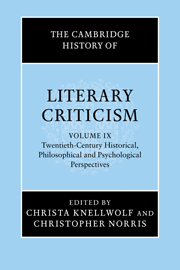Book contents
- Frontmatter
- Introduction
- HISTORY
- MARXISM AND POST-MARXISM
- FROM CULTURAL POETICS TO CULTURAL STUDIES
- 11 Mikhail Bakhtin: historical becoming in language, literature and culture
- 12 Cultural studies
- 13 Literature and the institutional context in Britain
- PSYCHOANALYTIC APPROACHES
- GENDER AND SEXUALITY
- COLONIALISM, POST-COLONIALITY, NATION AND RACE
- MODERNITY AND POSTMODERNISM
- PHILOSOPHY, AESTHETICS AND LITERARY CRITICISM
- INTERDISCIPLINARY APPROACHES
- Bibliography
- Index
- References
13 - Literature and the institutional context in Britain
from FROM CULTURAL POETICS TO CULTURAL STUDIES
Published online by Cambridge University Press: 28 March 2008
- Frontmatter
- Introduction
- HISTORY
- MARXISM AND POST-MARXISM
- FROM CULTURAL POETICS TO CULTURAL STUDIES
- 11 Mikhail Bakhtin: historical becoming in language, literature and culture
- 12 Cultural studies
- 13 Literature and the institutional context in Britain
- PSYCHOANALYTIC APPROACHES
- GENDER AND SEXUALITY
- COLONIALISM, POST-COLONIALITY, NATION AND RACE
- MODERNITY AND POSTMODERNISM
- PHILOSOPHY, AESTHETICS AND LITERARY CRITICISM
- INTERDISCIPLINARY APPROACHES
- Bibliography
- Index
- References
Summary
Exploring the relationship between literary criticism – English as an academic discipline – and the university during the course of the twentieth century, this essay argues that demands made on the university by the state have had a formative influence on the conception of literary criticism. At the beginning of the century the study of literature in Britain was seen both as a means of promoting pride in national identity and as a corrective to the materialist tendencies of the age. As the millennium approaches, there is widespread scepticism about whether ‘literature’ can maintain its status as a superior form of writing, which has resulted in a shift of focus from privileged works – the canon – to a study of the diversity of cultural forms and the relations between them. Such changes take place in the context of a move from the university as the provider of a liberal education, concerned with the development of the individual, to a more vocational one, concerned with the needs of the economy.
From the 1870s there was increasing pressure on the universities to forge closer links with industry. This was due to fears of slow growth and the increasing intensity of foreign competition, particularly from Germany. To meet this need, civic colleges were created in industrial cities such as Manchester, Birmingham and Liverpool. The attitude of the two ancient universities to this development is summed up in J. S. Mill's remark that ‘[u]niversities are not intended to teach the knowledge required to fit men for some special mode of gaining a livelihood. Their object is not to make skilful lawyers and physicians or engineers, but capable and cultivated human beings.'
- Type
- Chapter
- Information
- The Cambridge History of Literary Criticism , pp. 165 - 172Publisher: Cambridge University PressPrint publication year: 2001

